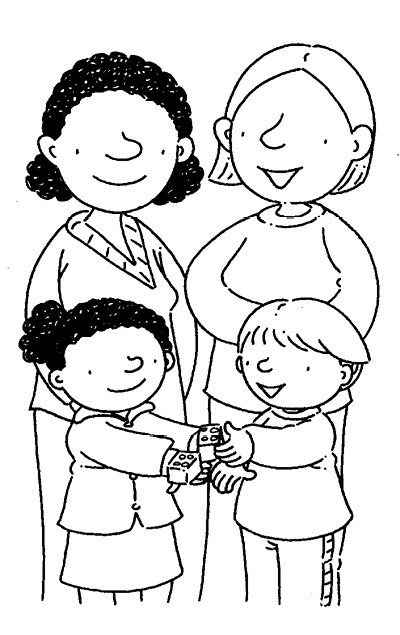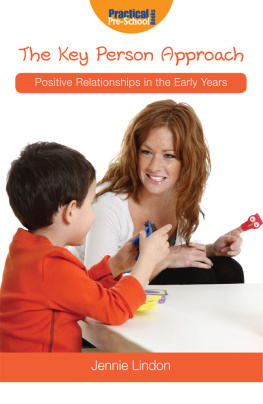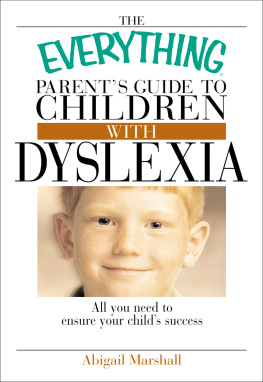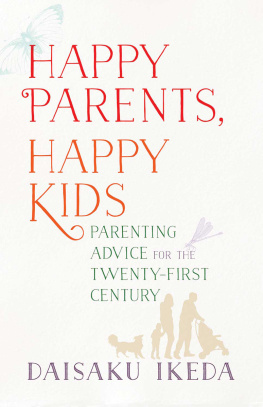Jennie Lindon - Parents as Partners
Here you can read online Jennie Lindon - Parents as Partners full text of the book (entire story) in english for free. Download pdf and epub, get meaning, cover and reviews about this ebook. year: 2012, publisher: Andrews UK, genre: Children. Description of the work, (preface) as well as reviews are available. Best literature library LitArk.com created for fans of good reading and offers a wide selection of genres:
Romance novel
Science fiction
Adventure
Detective
Science
History
Home and family
Prose
Art
Politics
Computer
Non-fiction
Religion
Business
Children
Humor
Choose a favorite category and find really read worthwhile books. Enjoy immersion in the world of imagination, feel the emotions of the characters or learn something new for yourself, make an fascinating discovery.
- Book:Parents as Partners
- Author:
- Publisher:Andrews UK
- Genre:
- Year:2012
- Rating:5 / 5
- Favourites:Add to favourites
- Your mark:
- 100
- 1
- 2
- 3
- 4
- 5
Parents as Partners: summary, description and annotation
We offer to read an annotation, description, summary or preface (depends on what the author of the book "Parents as Partners" wrote himself). If you haven't found the necessary information about the book — write in the comments, we will try to find it.
It is a widely acknowledged fact that if parents are involved in their childs early learning there is a positive impact on development and later school achievement. This title looks at how to build a positive relationship with the parents of children in your care, whether you work in a group or home setting. This book offers practical advice on: how to set up and maintain a respectful relationship with parents, what the EYFS expects of practitioners, how to encourage parental involvement, how to include fathers as well as mothers and working with hard-to-reach parents.
Parents as Partners — read online for free the complete book (whole text) full work
Below is the text of the book, divided by pages. System saving the place of the last page read, allows you to conveniently read the book "Parents as Partners" online for free, without having to search again every time where you left off. Put a bookmark, and you can go to the page where you finished reading at any time.
Font size:
Interval:
Bookmark:
Publisher Information
Published by Practical Pre-School Books
Parents as Partners converted and
Distributed in 2012 by
Andrews UK Limited
www.andrewsuk.com
This book is sold subject to the condition that it shall not, by way of trade or otherwise, be lent, resold, hired out or otherwise circulated without the publishers prior written consent in any form of binding or cover other than that in which it is published, and without a similar condition being imposed on the subsequent purchaser.
The characters and situations in this book are entirely imaginary and bear no relation to any real person or actual happening.
Copyright Jennie Lindon
The right of Jennie Lindon to be identified as author of this book has been asserted in accordance with section 77 and 78 of the Copyrights Designs and Patents Act 1988.
Published by Practical Pre-School Books, A Division of MA Education Ltd, St Judes Church, Dulwich Road, Herne Hill, London, SE24 0PB.
Tel: 020 7738 5454 www.practicalpreschoolbooks.com
The Meaning of Partnership

For many years now, good practice in services for young children has included a strong focus on bringing together the different parts of their life. In particular, practitioners within early years provision the full range of group settings and the childminding service have been expected to work closely with families.
Partnership within early years practice
The non-negotiable nature of partnership with parents is made clear in early years guidance across the UK. Establishing and maintaining close contact with young childrens families is a professional obligation. This book is linked to the Early Years Foundation Stage (EYFS): the 0 5 framework for England. However, the approach to good practice is consistent with principles which apply across the UK. For instance, the Care Commission in Scotland announced in 2009 that the focus in inspection will shift to reflect the details of the governments Early Years Framework. Part of this development is a greater emphasis on how settings actively involve parents and other family carers in their childrens early learning, including any identified needs.
The importance of partnership with parents is discussed throughout the EYFS materials and is prominent in the Statutory framework for the Early Years Foundation Stage, the publication that lays out what must be done. One of the overarching aims of the EYFS is that of, Creating the framework for partnership working between parents and professionals, and between all the settings that a child attends (Statutory Framework, page 7). So partnership is located positively within the obligation to ensure that a young childs life does not end up fragmented. The clear, professional responsibility is to make active connections between the home and setting on behalf of the child.
Partnership is raised within each of the four guiding themes of the EYFS: A Unique Child, Positive Relationships, Enabling Environments and Learning and Development. But it is especially highlighted within the context of relationships with the focus on, Loving and secure relationships with parents and/or a key person. The commitments of this theme are, focussed around respect; partnership with parents; supporting learning; and the role of the key person (Statutory Framework, page 9).
Partnership over children
Effective practice recognises that partnership is a continual process, not something that can be established, like a one-off project, and then left alone. Partnership working relies on practitioners relationships with a childs family, most often with the parent(s). The central aspects of the partnership therefore have to cover the following practice issues:
- Good, personal communication is crucial from the outset; from the time a parent makes an enquiry about your provision. Your relationship becomes established through the early conversations, as you explain what you offer and then, when the parent wants to take up a place, the further details,.
- You work in partnership with a parent in order to ease the transition as a child settles into your provision. This process will include some joint time together with the baby or child in your home, as a childminder, or an agreed minimum time for a parent to stay with their child in a group setting.
- The settling in process is for the emotional well being of both parent and child. But it is also for a childminder, or the key person in a group setting, to begin to build a personal understanding of this baby or child. Although you aim to be flexible, it would not be good practice to agree to next to no settling in time, perhaps because parents say they have inflexible work commitments or they cannot see the point.
- A welcome for parents to stay occasionally with their (now settled) child or to arrive early to join the group for tea. This kind of open welcome is also a very clear message to all parents that their child is safe and happy with you. You have no reservations about the unscheduled arrival of a parent.
- Easy communication between parents and practitioners as equals - about a baby or childs day and regular descriptive updates on an individual childs development. Regular conversation will be the way for anyone to raise any concerns - sooner rather than later - about a childs physical or emotional wellbeing, aspects of their development, or pattern of behaviour.
- Again, regular conversation will be the first option for practitioners to respond to queries or confusions from individual parents about what you do, how and why. Similar questions from several parents could let you know that there is a more general need for information and explanation.
- Good partnership includes a friendly end to the working relationship, as well as the beginning. A familys childminder or key person in a nursery should offer support for transition of the child and family from your provision and, as appropriate, onto the next provider or setting.

Links to your practice
Think over what you do within your practice that you count as partnership.
- The main focus for partnership needs to be on good communication and positive relations with individual parents. Do you give yourself credit for the effort you put into ordinary daily exchanges with a childs family?
- Childminders have much in common with the approach of a childs key person within a group setting. However, if you work from your own family home, you will not offer the range of events that might be organised by a nursery.
- Large settings, such as childrens centres, aim to bring some services onto their site. However, this ambition is unrealistic for settings like a private day nursery or playgroup.
- Are you evaluating yourself against a sensible pattern for your particular service?

Food for thought
The essence of good practice is not so much the particular approach to the involvement side of partnership, but how practitioners develop an initiative and how they behave towards families. It is also crucial to keep a firm hold on positive experiences for babies and children. For instance:
- It would be irresponsible to develop a wide range of daytime events for parents, if that required taking practitioners away from the children.
- A welcome for parents within the day may have to be balanced against the impossibility for practitioners to share their attention between a young child and an emotionally needy parent.
Font size:
Interval:
Bookmark:
Similar books «Parents as Partners»
Look at similar books to Parents as Partners. We have selected literature similar in name and meaning in the hope of providing readers with more options to find new, interesting, not yet read works.
Discussion, reviews of the book Parents as Partners and just readers' own opinions. Leave your comments, write what you think about the work, its meaning or the main characters. Specify what exactly you liked and what you didn't like, and why you think so.




